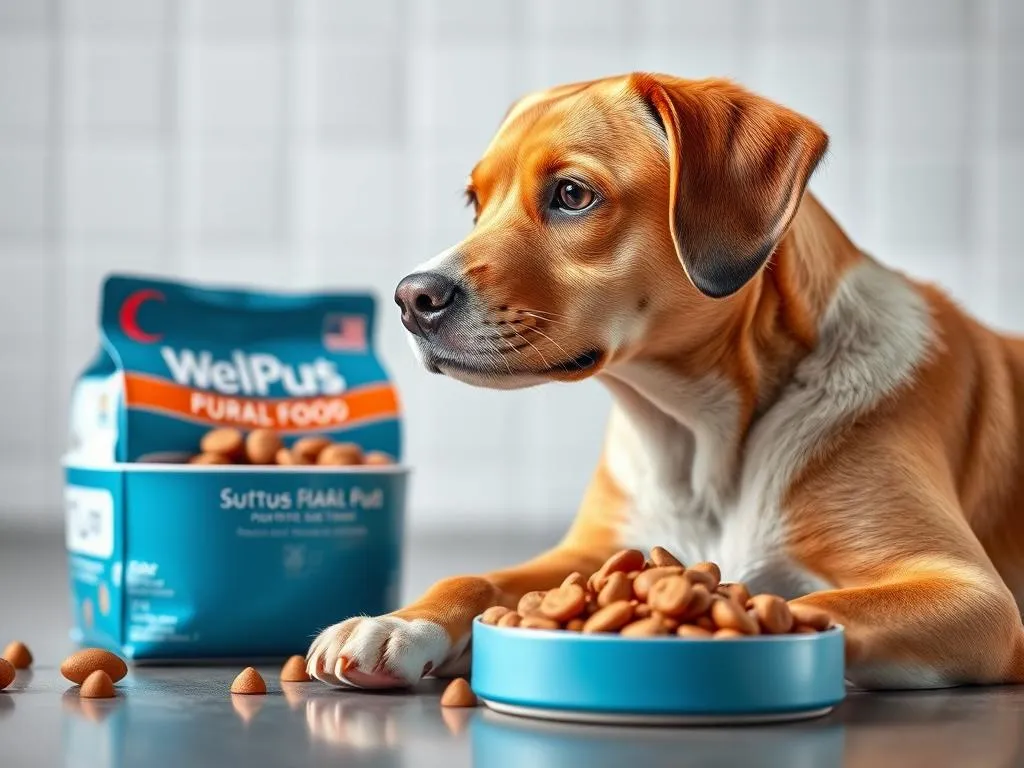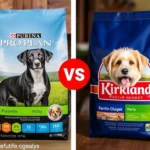
Introduction
Proper nutrition is vital for all dogs, but it becomes even more critical when a dog is nursing. A nursing mother requires a diet that provides the necessary calories and nutrients to support her health and the growth of her puppies. The right diet not only helps in milk production but also ensures that the mother stays healthy during this demanding time. This article explores the best dog foods for nursing dogs, focusing on their unique nutritional needs, food characteristics, and specific recommendations.
Understanding the Nutritional Needs of Nursing Dogs
The Importance of Nutrition During Lactation
When a dog is nursing, her body undergoes significant changes. Lactation increases caloric requirements by 25-50% compared to her normal needs. This increase is essential to support the growth and development of her puppies. If a nursing dog does not receive adequate nutrition, it can lead to health issues for both the mother and her puppies, such as low milk production and weakened immune systems.
Key Nutrients for Nursing Dogs
Nursing dogs have specific nutritional requirements. Here are the key nutrients essential for their health:
-
Protein: This macronutrient is crucial for milk production and helps maintain the mother’s muscle mass. High-quality protein sources, such as animal meats, should be included in her diet.
-
Fats: Healthy fats, particularly omega fatty acids, provide concentrated energy and contribute to the quality of the milk. They also play a vital role in the development of puppies.
-
Vitamins and Minerals: Essential vitamins like A, D, E, and K, along with minerals such as calcium and phosphorus, are important for bone health and overall wellness. These nutrients help in the proper growth of the puppies and keep the mother in good health.
Characteristics of High-Quality Dog Food for Nursing Dogs
Ingredients to Look For
When selecting the best dog foods for nursing dogs, it’s important to consider the ingredients:
-
Whole Meats and Animal By-Products: High-quality dog food should list whole meats as the first ingredient. Animal by-products can also provide essential nutrients, but they should come from reputable sources.
-
Whole Grains vs. Grain-Free Options: While some dogs thrive on grain-free diets, others may benefit from whole grains like brown rice and oatmeal, which provide essential carbohydrates for energy.
-
Fruits and Vegetables: Ingredients such as blueberries, carrots, and spinach can enhance the vitamin content and provide antioxidants that support the overall health of nursing dogs.
Avoiding Harmful Ingredients
Not all dog foods are created equal. Here are some common fillers and additives to avoid:
-
Artificial Additives: Preservatives, colors, and flavors can be harmful. Opt for natural ingredients whenever possible.
-
Harmful Grains: Certain grains, such as corn and soy, can cause allergies and digestive issues in some dogs. It’s best to choose high-quality alternatives.
Types of Dog Food Suitable for Nursing Dogs
Dry Dog Food (Kibble)
Kibble is a popular choice for many dog owners due to its convenience and shelf stability. However, there are benefits and potential drawbacks:
-
Benefits: Kibble can help maintain dental health due to its crunchy texture and is often fortified with essential vitamins and minerals.
-
Drawbacks: Some kibble can be low in moisture, which might not be ideal for nursing dogs who may need more hydration.
Recommended Brands and Specific Formulas
When looking for kibble, consider brands that focus on high protein content and quality ingredients. Some recommended brands include:
- Orijen Puppy Formula: High in protein and made with fresh ingredients.
- Taste of the Wild High Prairie Puppy: Grain-free and rich in omega fatty acids.
Wet Dog Food (Canned)
Wet dog food is another excellent option for nursing dogs due to its moisture content and palatability.
- Advantages: Canned food is generally more appealing to dogs and can help keep them hydrated. The moisture content is particularly beneficial for nursing mothers.
Best Wet Food Options for Nursing Dogs
Look for high-quality canned food brands that include real meat as the primary ingredient. Recommendations include:
- Wellness CORE Grain-Free Puppy Food: High in protein and contains no fillers.
- Blue Buffalo Homestyle Recipe Puppy: Features real meat and wholesome grains.
Homemade Dog Food
For those who prefer a hands-on approach, homemade meals can provide tailored nutrition for nursing dogs.
Guidelines for Preparing Balanced Meals at Home
When preparing homemade food, ensure it is balanced with proteins, carbohydrates, and fats. Key ingredients might include:
- Lean meats (chicken, turkey, beef)
- Cooked grains (brown rice, quinoa)
- Vegetables (carrots, peas, sweet potatoes)
Key Recipes and Ingredient Suggestions
Here’s a simple recipe for a nutritious homemade meal:
- Ingredients:
- 1 pound of ground turkey
- 1 cup of brown rice (cooked)
- 1 cup of carrots (chopped)
- 1/2 cup of peas
-
1 tablespoon of fish oil (for omega fatty acids)
-
Instructions:
- In a large pot, cook the ground turkey until browned.
- Add the cooked rice, carrots, and peas, mixing well.
- Stir in the fish oil and serve once cooled.
Raw Diet
Some owners choose to feed their nursing dogs a raw diet, which consists of uncooked meats, bones, fruits, and vegetables.
Overview of Raw Feeding and Its Suitability for Nursing Dogs
A raw diet can be nutrient-dense and may promote better digestion. However, it requires careful planning to ensure nutritional balance.
Safety Considerations and Best Practices
If considering a raw diet, consult with a veterinarian to establish a balanced meal plan and to learn about safe food handling practices to prevent contamination.
Recommended Dog Food Brands for Nursing Dogs
Top Commercial Brands
Choosing the right commercial brand is crucial for nursing dogs. Here are some top picks:
-
Royal Canin Size Health Nutrition: Tailored for nursing mothers, this formula is rich in nutrients and energy.
-
Hill’s Science Diet Puppy: Contains DHA from fish oil, which supports brain development and is perfect for nursing mothers.
-
Purina Pro Plan Puppy: Offers high protein content and essential vitamins for nursing dogs and their puppies.
Budget-Friendly Options
For pet owners on a budget, there are still nutritious options available:
-
Pedigree Puppy: Affordable and formulated for growing puppies, making it a suitable choice for nursing mothers.
-
Iams ProActive Health Puppy: Provides a balance of protein and fat, ensuring nursing dogs receive adequate nutrition without breaking the bank.
Feeding Guidelines for Nursing Dogs
Portion Sizes and Feeding Frequency
Feeding a nursing dog requires careful consideration of portion sizes and frequency:
-
A general guideline is to feed nursing dogs approximately 1.5 to 2 times the amount they would typically eat. This can vary based on the size of the dog and the number of puppies she is nursing.
-
Feeding should occur 3-4 times a day to ensure the mother has consistent energy levels.
Monitoring Health and Adjusting Diet
It’s essential to monitor your dog’s health during nursing:
-
Signs of Adequate Nutrition: A healthy, nursing dog will have a shiny coat, good energy levels, and produce enough milk for her puppies.
-
Signs of Malnutrition: If a nursing dog appears lethargic, loses weight, or has a dull coat, it may indicate inadequate nutrition. Consult with a veterinarian for dietary adjustments.
Common Challenges and Solutions
Decreased Appetite
Some nursing dogs may experience a decreased appetite. Possible causes include stress or discomfort.
How to Encourage Eating
-
Enhance the Appeal: Mix in wet food or add warm water to dry kibble to make it more enticing.
-
Frequent Small Meals: Offering smaller portions more frequently can encourage eating.
Weight Management Post-Lactation
After nursing, it’s important to transition back to a regular diet gradually.
Strategies for Transitioning
-
Gradual Changes: Slowly mix in the new food with the old food over a week to avoid digestive upset.
-
Monitor Weight: Keep an eye on the dog’s weight; if she gains too much, adjust portion sizes accordingly.
Conclusion
Proper nutrition is vital for nursing dogs to ensure their health and the health of their puppies. Choosing the best dog foods for nursing dogs involves understanding their unique nutritional needs, selecting high-quality ingredients, and providing adequate portions. By being attentive to dietary requirements and monitoring health, pet owners can support nursing mothers effectively during this crucial time. Always consult with a veterinarian for personalized advice tailored to specific needs.









